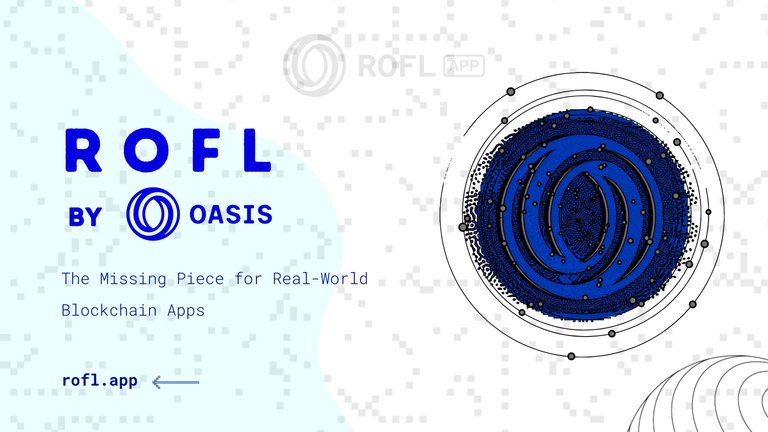It's no news that Web3 developers face a brutal trade-off. Build on a blockchain and sacrifice speed, privacy, and real-world connectivity, or abandon the decentralized dream altogether.
For years, this seemed like an unavoidable choice, until now.
ROFL (Runtime Offchain Logic) is rewriting the rules. Developed by the Oasis, this framework lets you run complex logic away from the blockchain's prying eyes while keeping every bit of cryptographic trust intact.
The result? Applications that actually work in the real world.

The Blockchain Straight Jacket
Traditional blockchains operate like a glass house where everyone can see everything, and every computation crawls at the speed of global consensus. This creates three crushing limitations that have held back Web3 adoption for years:
Speed kills innovation. Complex operations drain gas faster than a muscle car burns fuel. What should take milliseconds stretches into expensive minutes of network validation. Simple database operations that cost pennies in traditional apps suddenly demand dollars in gas fees. Developers find themselves choosing between functionality and affordability, often abandoning features that users actually want.
Privacy is a pipe dream. Every input, calculation, and output is broadcast to the world. Try building a trading bot when your strategy is public knowledge, or a healthcare app when patient data lives on a public ledger. Financial institutions won't touch systems where transaction amounts are visible to competitors. Healthcare providers can't store patient records where anyone can read them. The transparency that makes blockchains trustworthy also makes them practically unusable for sensitive applications.
The outside world doesn't exist. Need real-time weather data? Stock prices? API calls? You're stuck with oracles, bridges, and a web of trust issues that make Fort Knox look casual. Each external data source introduces new attack vectors and single points of failure. Machine learning models? Forget about it. Complex analytics? Not happening. The blockchain lives in isolation, unable to tap into the rich ecosystem of services that power modern applications.
The ROFL Framework: Offchain Logic, Onchain Trust!

ROFL cracks this puzzle by moving your heavy computation into a Trusted Execution Environment (TEE). You can think of it as a bulletproof, tamper-evident box that even the server owner can't peek inside.
Your logic runs at native speeds, handles private data, calls external APIs, and then produces a cryptographically signed result that your smart contract can verify and trust. The TEE acts as a secure computing fortress where your code executes in complete isolation, protected from both external attackers and the infrastructure providers themselves.
This architecture resolves the blockchain trilemma without compromise. Speed is achieved through native execution outside the consensus layer. Privacy is ensured by encrypted computation, which shields data from all observers. Scalability is enhanced by removing computational bottlenecks that previously hindered network performance.
The framework works with any programming language, any blockchain, and requires zero TEE expertise. Write your app in familiar tools, deploy it through the Oasis CLI, and watch it integrate seamlessly with your smart contracts. No new languages to learn, no exotic programming models to master.
Already Battle-Tested
While other projects promise future solutions, ROFL is already powering real applications:
Zeph created the first truly private AI assistant. Your conversations happen inside a TEE where even the platform operators can't eavesdrop. It's like having a personal AI that actually keeps secrets.
WT3 built an autonomous trading agent that executes strategies offchain, manages private keys securely, and pulls live market data - all while keeping the logic invisible to competitors.
These aren't demos or proofs of concept. They're live applications solving real problems that traditional blockchains simply can't handle.
We also have Plurality Network, Thorn Protocol, Flashback, and Tradable. All of them are leveraging ROFL.
Beyond the Obvious
ROFL opens doors to entire categories of applications that seemed impossible before:
Financial tools can run complex simulations privately, hiding trading algorithms and user balances while still proving results onchain. Hedge funds can deploy strategies without revealing their edge. DeFi protocols can offer sophisticated risk models without exposing their mathematical foundations to competitors.
Games can use true randomness, conceal player strategies, and validate complex rules without exposing the underlying mechanics. Poker games can shuffle cards privately. Strategy games can hide fog-of-war calculations. RPGs can generate loot drops without revealing the probability tables.
Voting systems can collect private ballots, tally results in complete secrecy, and publish only the final, verified outcome. Corporate governance, political elections, and community decisions can all benefit from cryptographic privacy without sacrificing transparency of results.
Real-world integrations can pull data from any API, run machine learning models, or trigger external actions - all while maintaining cryptographic proof of correctness. Weather derivatives can use real meteorological data. Insurance claims can incorporate IoT sensor readings. Supply chain tracking can verify authenticity through external databases.
Healthcare applications can process patient data privately, run diagnostic algorithms, and share results with authorised parties without exposing sensitive medical information to unauthorised observers.
Built for Builders
ROFL ditches the academic complexity that plagues most blockchain tools. You can:
- Write in Python, Go, JavaScript, or whatever language you prefer
- Deploy containerized applications without learning new paradigms
- Use familiar development patterns instead of wrestling with blockchain quirks
- Access comprehensive documentation and working examples
The barrier to entry is your existing programming knowledge. Nothing more.
Start Building Today
Ready to break free from blockchain limitations?
- Head to rofl.app and explore the quickstart guide
- Deploy your first offchain logic using the ROFL CLI
- Test your application on the Testnet Explorer
- Apply for a grant at oasis.net/grants-program-application if you're building something ambitious
Complete documentation lives at docs.oasis.io/build/rofl/
What does the Future Hold?
ROFL proves that the blockchain trilemma, decentralisation, security, and scalability, was never about choosing two out of three. It was about choosing the right architecture.
By moving computation offchain while keeping verification onchain, ROFL gives developers what they actually need: the freedom to build powerful applications without sacrificing the trust that makes blockchain technology valuable.
The glass house is finally getting curtains. The question is: what will you build behind them?

Reference
https://oasis.net/blog/rofl-mainnet-launch
https://docs.oasis.io/build/rofl/
https://oasis.net/blog/tdx-support-rofl
Posted Using INLEO
Some things don't even need to be on a blockchain.
Well, this is true. But then it has come to stay and with the right tools and mechanisms, it's solving and will solve so many real life problems.